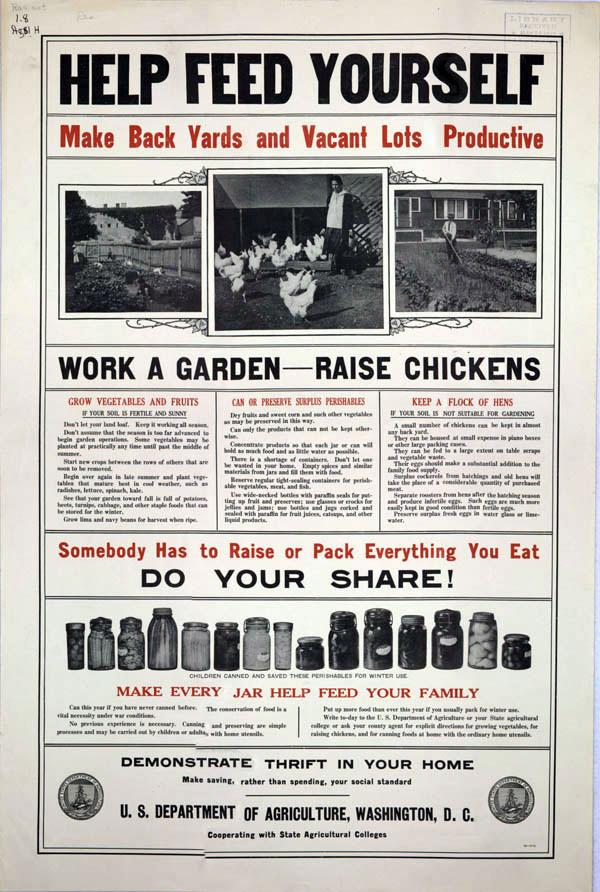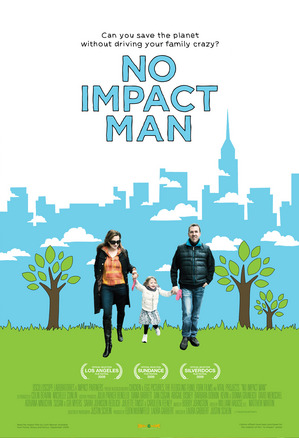July 2010 Archives

I ran across this image today and thought it was great. I know that today we have less reason to garden. Our food isn't rationed, and we're not in a war that would require people to skimp and save. However, local food is a great way to reduce your impact on the environment. Farmers Markets are great for getting local food. However not everything at the farmers market is necessarily local and/or organic. Always make sure you ask where the food is from, and how it was produced.
Growing your own garden is a great way to be assured that the food is local and chemical free. Plus nothing tastes better than food you've produced yourself. So try it! Grow your own garden whether it's in your backyard, on your patio, on your balcony, or in a community garden close to your house.
You can find more of these images in this gallery titled Beans are Bullets
Since moving into my house in the spring of 2007, I've been wanting to have a garden. It's been a long time coming because of other issues that had to be dealt with first. I did till a small plot within my backyard fence for some herbs, and to hold some hostsa for my flowerbeds while foundation work was being done to my house. The problem with that plot was not a lot of sunlight because of the tall oak trees I have in my backyard. Luckily enough my back fence is inset off the back lane by about 10 feet, so I have ample room back there for a bit of a garden.
Why Be Wasteful?
I think it's good to reverse this question right from the get go. Why be wasteful? Waste is a fact of life, and all plants and animals produce waste in our environment. The difference between us and the rest of life on the planet is that a vast majority of our waste is not useful to other forms of life. This is either because of it's make up or its quantity. Wasteful habits are sold to us as being more convenient or easier on our pocketbook.
Convenience
Individual yogurts are quick and easy to take out of the fridge and put into a lunch, but it doesn't really saving that much time over taking a larger container of yogurt out of the fridge and placing a serving into a reusable container.
It's easier just to use the bags at the grocery store instead of bringing our own, but reusable bags are not that much of an inconvenience to bring along with us, and wash from time to time.
Cost
It's cheaper to buy a foil pan for roasting a chicken instead of buying a reusable one, but it's not cheaper over the years, and definitely not cheaper than borrowing one.
Styrofoam plates are much cheaper than paper plates made from recycled paper, but the cost to the environment when they are disposed of in a landfill is not factored into the price.
So Why Do We Do It?
A lot of these things are not really more convenient, or cheaper if we factor in the true cost of disposal. They are sold to as as if they are, and we don't question it. It's a natural thing to not question things we are told. In our busy lives questioning takes time and energy. Something that we don't always excess amounts of. So, if these these aren't really cheaper, and aren't really more convenient, then we don't have a good reason to be so wasteful.
Bad Habits
Even once we figure out that these things may not be more convenient or cheaper we continue to do them. That's because they become habit, and that bad habit needs to be broken. Change is not always easy. When we spill a drink, it is so easy out of habit to grab the roll of paper towel to clean it up instead of a cloth towel. Though that habit can be replaced with the habit of questioning, is there a better way that I could be doing this?
Why Be Green?
We have a responsibility to take care of this planet for our own well being, and for the well being of future generations. The Earth is getting more densely populated, and it is easier and easier for us to have huge negative impacts on the environment. We shouldn't wait until the environment is in critical condition at the edge of collapse before we do something
Preventative Measures
Doctors don't like to wait until someone has a heart attack until they tell them that they should lower their cholesterol. We shouldn't wait until the climate is at the brink of collapse before we decide to change our habits. We know that cholesterol in the blood is bad so we try to prevent it from getting high in the first place. We also know that many things that we do to our environment aren't good, so we prevent ourselves from harming it in the first place.
Respect
It all comes down to respecting our surroundings and our environment. We need to look at the big picture and realize that we can have massive impact on our surroundings and environment. Most people tend to treat their own backyard with respect. If we learned to treat the Earth as a whole as an extension of our backyard, then we would have more respect for the environment as a whole.
When I was at the bookstore recently I found a book called Practically Green. I decided that I should change the name to this site before I get to attached to it. For the time being it'll be nameless until I come up with a new one.

Colin Beavan, a New Yorker, decides to try and live is life with no appreciable impact on the environment for a year. Going to the extreme of trying to live in a New York apartment with not electricity, not using any type of transportation that uses electricity or fossil fuels. The only exception being a trip to visit the farmers that he is purchasing food from in the farmer's market.
Beaven had his motives questioned throughout the movie by both environmentalists and non environmentalists alike. Was his motivation for making the movie fame and fortune, or did he genuinely care about the environment.
I had never heard of this movie before, or about Colin Beavan's blog by the same name, No Impact Man. Immediately I thought that trying to go the the extreme of living with no impact on the environment in the manner he was going was extreme, and a bit silly. I definitely can understand why his motivation was called into question.
In my opinion Beaven's heart is in the right place, and in the end this movie is more about his personal journey to find out what things he can do without in his life. The part I found the most amusing about the movie was the dynamic between Beaven and his wife Michelle Conlin who seemed to be more along for the ride than an active participant.
While I wouldn't recommend going to the extreme of living for a year like this, I do think it is worthwhile to take a look at how you're living your life, and whether there are things that you can do without that would improve your impact on the environment.
The second thing that has continued to motivate me to try to live green is the outdoors. I grew up going through Beavers, Cubs, Scouts, and yes Venturers. I was lucky enough to be involved in highly active troops that spent a lot of time in the great outdoors. We had annual Klondike days where we got to practice our outdoorsmanship. We had large camps and jamborees, which usually was pretty easy light camping in large open fields. Finally we went on camps just as a troop in a little bit more remote locations. The last trip I went on was a 14 day hike at Philmont Scout Ranch in New Mexico. That was a great experience, living with what you could carry on your back. We didn’t carry 14 days worth of food with us, there were frequent food pickups and garbage drop offs every three to four days.
I’ve been aware, and involved in living green since I was in elementary school through the late 80’s and early 90’s. In the beginning my father convinced me to start recycling aluminum cans. While it was more for the money than it was for saving the environment, it was my first experience with recycling. I collected cans from neighbours, family reunions, any kind of event where people were drinking out of cans. Of course my favorite were beer cans, because the vendors paid back a deposit on those. The pop cans were just crushed and taken to an metal recycling center and I was paid by the pound. After several summers, and my grandpa sending me to the metal recycling center with copper wire and some old car transmissions, I was able to buy a bike with my money. That was the greatest feeling in the world riding a bike that I had basically paid for myself. Shortly after that I got involved in a much larger recycling program.
The fact of the matter is that moving toward sustainability is easier than most people think. There are many changes that each of us can make in our day to day life that will reduce our impact on our environment. It’s not easy to wake up one morning and live a perfectly green sustainable life. As I often say, life gets in the way of life. However if we remain conscious of what we’re doing day to day, we can change our habits over time. Small steps in the right direction are progress now matter how you look at it.
A common fallacy that I often hear when it comes to green living is what I’ve heard referred to the Utopian Fallacy. Basically it is the idea that unless a solution is perfect, then it’s not a solution at all. It’s a very black and white view of the world. Well the world isn’t black and white, and a step in the right direction is better than standing still. People on both sides of the environmental debate fall into this fallacy’s trap. The danger with this trap is that it stagnates progress because no one wants to move in the right direction unless we get to where we’re wanting to go in one move. This is akin to a hitch hiker not taking a ride from someone going their direction just because they’re not going quite far enough.
Note: At this point I’m not sure where this site is going, what I’m going to write about, whether I have anything unique to say, how long it’s going to last, whether I’ll find any body that is interested in it.... But I’m taking one step at a time. Note: This site is a work in progress, especially at the beginning. Expect to see some design changes, and possibly some growing pains at the beginning.
